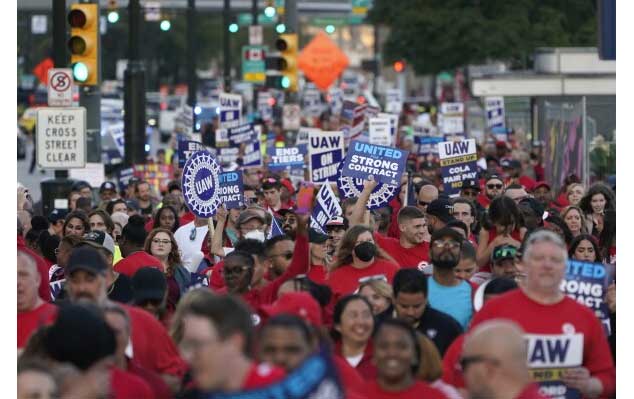The United Auto Workers (UAW) union expanded its strike against major automakers on Friday, abandoning 38 GM and Stellantis parts distribution centers in 20 states.
Another 5,600 workers joined the strike, in addition to 13,000 of the union’s 146,000 members who went on strike a week ago.
UAW President Sean Fine said Ford was spared additional strikes because the company met some of the union’s demands during negotiations last week.
“We’ve made some real progress at Ford,” Fine said during an online presentation to union members. He added: “We still have serious issues to resolve, but we want to realize that Ford is showing that it is serious about reaching an agreement.”
“At GM and Stellantis, it’s a different story,” he said. He said that these companies rejected the union’s proposals regarding increasing the cost of living, profit sharing, and job security.
The union is highlighting the huge gains automakers have recently made by seeking a 36% pay rise over four years. The companies offered just over half that amount. The UAW has other demands, including a 32-hour workweek with 40-hour pay and restoring traditional retirement plans for new workers.
The companies say they cannot give in to the union’s demands despite their huge profits because they need to invest in switching to electric cars.
The UAW’s contract with the automakers expired at midnight on September 14, and workers walked out of a Ford assembly plant near Detroit, a General Motors plant in Wentzville, Missouri, and a Stellantis-operated Jeep plant in Toledo, Ohio.
FIN stated a few days ago that it would call strikes at other factories unless significant progress is made in contract negotiations with manufacturers. Negotiations continued on Thursday, although neither side announced significant progress, and significant disagreements remained over salary increases.
Companies have laid off thousands of workers because, they say, factories lack auto parts due to the strike.
However, the effects have yet to be felt on car dealers – it will likely take several weeks before the strike causes significant shortages of new cars, according to analysts. However, prices could rise sooner if the prospect of a prolonged strike sparks panic buying.
Friday’s decision is crucial for Finn, who narrowly won the elections held in March and ousted the union’s president at the time. He pursued the unusual strategy of simultaneously negotiating with Detroit’s Big Three automakers.





